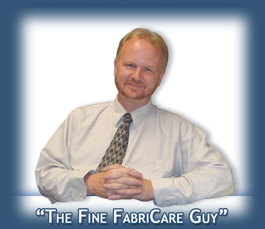Q - Hey Jim,
I'm about to start messing around with upholstery, but before I go ruining my family's furniture I was hoping you can help me out a little.
Procyon, Hot Water and a Hair Brush will ruin which of these fabrics? Thanks in advance for the responses – (hopefully there are responses
- Natural Fabrics
* Cotton, Cotton Blends, Leather, Linen, Silk, & Wools - Synthetics
* Acetate, Acrylic, Microfibre, Nylon, Olefin, Polyester, Rayon, & Vinyl
- From a Potential New Diversifier
---------------------------------------------------------------------------
A- Thanks for your interesting request!
I'm not comfortable offering advice on a branded product; those are answers better given by the manufacturer, but I hope these thoughts help:
- Very few cleaning agents of any sort harm FIBERS (such as you listed).What they may do is cause dye instability (bleeding or fading) or contribute to cellulose browning in cotton, linen, and rayon. Highly buffered alkaline materials may harm wool and silk fibers themselves. Fibers that are weaker when wet, such as rayon and acetate, may not be damaged by a cleaning agent, but by brush or tool agitation.
- Identifying specific fibers on upholstery can be challenging.
Upholstery fabric manufacturers often blend two or more fibers together, and sometimes coat the back of the fabric with coatings to stabilize the fabric. This creates a condition where the conventional burn test charts become nearly useless.
Since most problems with upholstery come from fabrics that contain fibers that are protein (wool/silk) or cellulose (cotton/linen/rayon), you can identify these by the fact that they crumble or smear in your finger tips after they are ignited. Any synthetic materials blended in will melt to a hard bead, but the protein/cellulose will still show up. - Always conduct a color bleeding test.
- Be careful not to overwet the fabric during the cleaning process, and dry the material as quickly as possible afterward. Fabrics that dry quickly rarely have bleeding or browning problems.
- You'll get better results on your natural (cellulose/protein) fibers with a neutral detergent and gentle agitation than with an alkaline, "detergent free" product like you are using. A few good upholstery preconditioning agents are: Prochem Fine Fabric Shampoo, Bridgepoint Fabric Shampoo, Masterblend Upholstery Shampoo.
- Get to a training class as soon as you can. I've given you a few hints here, but going to a class where you can learn to do the tests and try out various methods and products will help you far more than my few thoughts here will.
Jim Pemberton
